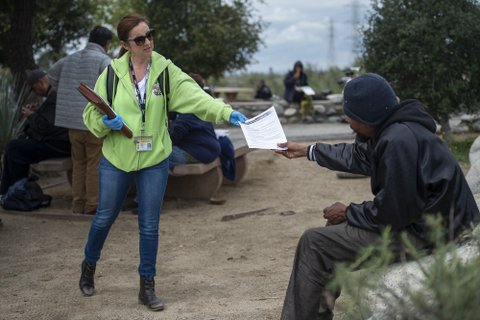
22 Jul ‘This Is a Pandemic of Trauma. Everybody Is Feeling the Pain…’

Elizabeth Cope, mental health clinical supervisor with the Home Outreach Team, distributes COVID-19 information near the San Gabriel River in March. (Los Angeles County via Flickr)
By Barbara Feder Ostrov, CalMatters
As COVID-19 cases surge in California, some of the state’s leading mental health professionals warned of long-lasting psychological fallout that will require enormous investment to help Californians who are suffering. Yet they also praised innovative experiments during the pandemic and said there is reason for hope.
“This is a pandemic of trauma. Everybody is feeling the pain and suffering from stress and anxiety and depression across the board,” said Dr. Jonathan Sherin, director of the Los Angeles County Department of Mental Health, at “PolicyMatters: The Crisis in California Mental Health.” The virtual panel Tuesday was sponsored by CalMatters and moderated by reporter Jocelyn Wiener.
“We know that unemployment rates have skyrocketed, compounding preexisting stress and all the other pressures making it hard to survive.”
DR. RHEA BOYD, UCSF BENIOFF CHILDREN’S HOSPITAL
“We’re going to see upticks in suicide,” Sherin said. “We’re likely to see a large level of deterioration that we have to get in front of.” Even before the pandemic and preceding recession, California already struggled with a mental health system widely considered to be dysfunctional. Most counties lack psychiatric beds for uninsured patients, particularly youth. Community behavioral health and addiction programs have faced budget cuts. While private insurers cover mental health treatment, it can be hard to obtain despite parity laws. And in some regions of the state, trained mental health workers are in short supply. More than 1.1 million California adults reported a serious mental illness in the previous year, according to a 2017 federal survey.
Gov. Gavin Newsom promised “an aggressive agenda to lift California’s approach to mental health care into a national model.” But some of that work was embedded in a massive planned revamp of the state’s Medi-Cal program that has been put on hold amid the pandemic.
Panelists highlighted longstanding mental health concerns that have come to the forefront amid national protests over police brutality and systemic racism.
“Families are facing a confluence of crises. Families of color and Black and indigenous people in particular are facing the threat of police brutality,” said Dr. Rhea Boyd, a pediatrician practicing at the Palo Alto Medical Foundation and University of California San Francisco Benioff Children’s Hospital Oakland. “We know that unemployment rates have skyrocketed, compounding preexisting stress and all the other pressures making it hard to survive.”
Among the panel’s other takeaways:
- Panelists said policymakers should ease the way for more services to be provided in new ways, including tele-therapy and mobile mental health vans serving the homeless and other hard-to-reach populations. “Let us in the trenches show you how we can help care for people more effectively – rather than in a top-down way that lets us know what we’re permitted to do,” Sherin said.
- Consider preventive mental health services before children, especially, are diagnosed and “pathologized.” Boyd noted that state and federal policies require children to receive a potentially stigmatizing diagnosis before they can receive any type of help. “Child mental health in our state is an abomination,” Boyd said. “We force kids into a medical model” that may not work for them, she said.
- California officials will continue working to hold private insurers accountable when they inappropriately deny mental health care to their members, said John Connolly, deputy secretary for behavioral health for the California Health and Human Services Agency. Amid many budget cuts, the state has kept money for the Department of Managed Health Care to investigate and sanction insurers for failing to provide mental health care required under federal and state parity laws.
- Attempts to house the homeless in hotels during the pandemic, including Project Roomkey, have not always been followed up by mental health and other services, said C.W. Johnson, outreach coordinator at the Mental Health Association of San Francisco. “They’re just getting a safe place to stay. They may be safe from COVID-19 but not all the other risks they deal with. We’re solving one problem but others aren’t being addressed,” including food and medical care in addition to mental health care, Johnson said. “We have to do outreach and we have to get out there. Until we get more innovative, people are going to suffer.”
Watch the full conversation here:






No Comments